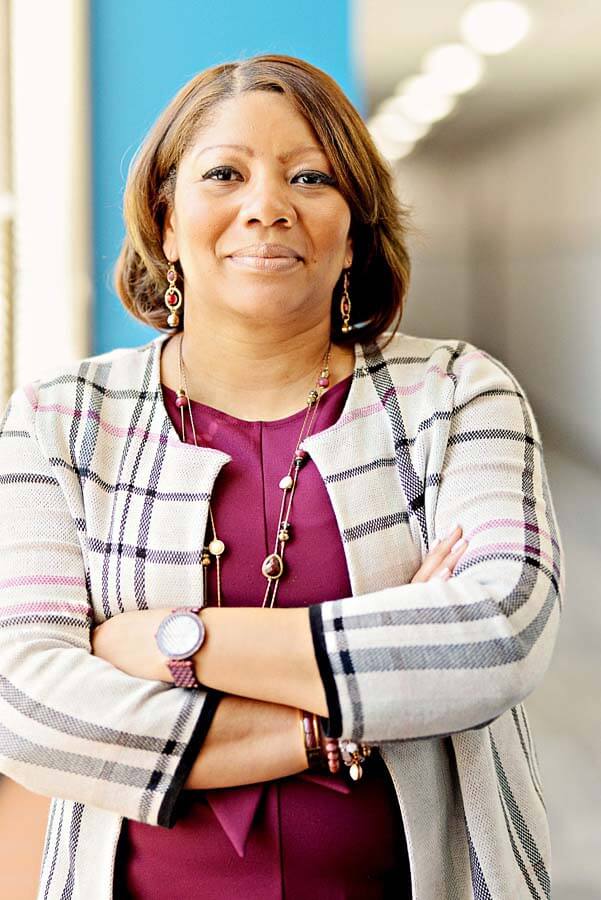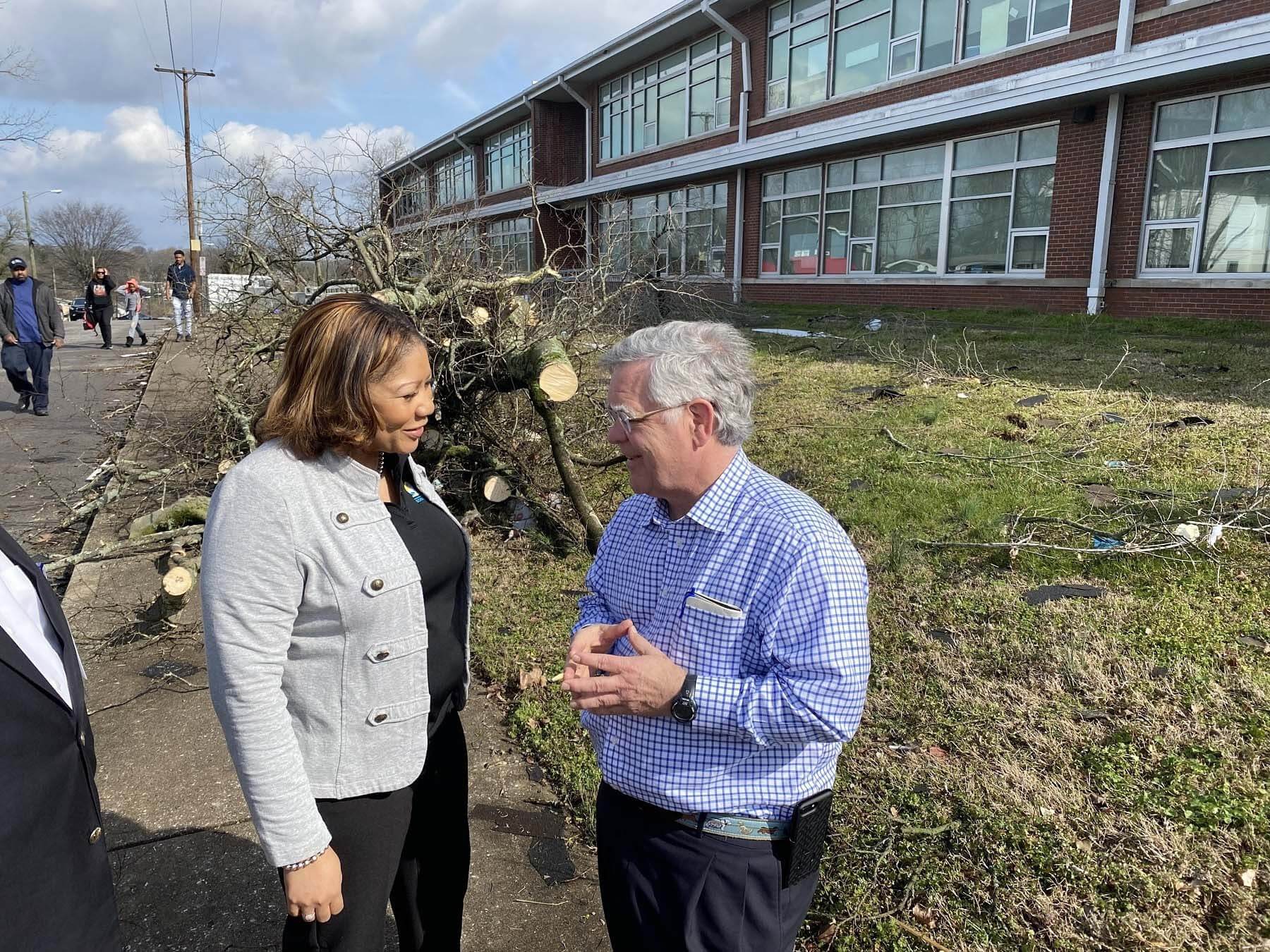On the morning of March 3, 2020, Dr. Adrienne Battle arrived at Robert Churchwell Museum Magnet Elementary School to assess the damage from the tornadoes that had ripped through Middle Tennessee just a few hours prior. “It was pretty devastating to see the damage to the school building,” says the Director of Metro Nashville Public Schools. “That was a very profound moment that I will never forget.”
It was in that moment that Dr. Battle, who was then serving as Interim Director, knew it was time to roll up her sleeves and get to work. “I just thought OK, this has happened. What are the immediate next steps to take to ensure our students continue to be educated and connected to their classmates and the adults who they feel are family?”
Those “next steps” meant closing MNPS schools for a few days while Dr. Battle, herself an MNPS graduate, worked with her team to relocate students as necessary and get everyone back on track for the final stretch of the school year. As students returned to school after the tornado, the first COVID case was diagnosed in Davidson County. So a few days later, MNPS again closed its schools’ doors. “I think one of the greatest challenges we faced in that time was continuing to support and educate our students during a time of closure,” explains Dr. Battle, who was officially named Director of Schools on March 13, 2020. “Based upon state decisions, our school year literally ended in March, but we had a commitment to continue to support and serve our students, and that’s what we did.”


RELATED: How to Help Tornado Victims
Continuing to serve the students was no small feat for a school district that has long been underfunded. While the end of the school year was an all-hands-on-deck effort — parents helping their children log on to Zoom meetings as teachers scrambled to learn the ropes of virtual education on the fly — the equity gap was exposed for all to see as schools arranged for laptop and hotspot distribution for students who had neither a computer nor internet access. “The district has been underfunded for years,” Dr. Battle continues. “So with the underfunding and then the city facing a budget crisis, to be able to expand our services and our reach to our students and families [at that time] was a challenge.”
As the school year fizzled to a close, it was then that the real work began. “We immediately began planning for various scenarios in the fall, and one was all virtual,” Dr. Battle explains. She and her team also looked at what returning to school would look like in a modified traditional sense as well as with a hybrid option.
In late June, Mayor Cooper’s office announced that it was allocating $24 million of the approximate $121 million in funding it received from the federal CARES Act to be used for technology provisions for MNPS students — the goal being to ensure that every student in the district had a computer and WiFi access in the event the school year would be all virtual. With that piece of the puzzle in place, Dr. Battle and her team set to work figuring out the logistics of potentially shifting all 86,000+ MNPS students into a virtual learning environment.
RELATED: Sharon Gentry: FACES of Nashville
While no one could fathom a school year that started completely online — due to a global pandemic, no less — on August 4, 2020, that’s exactly what happened. In the weeks leading up to the first day of school, parents were kept abreast of plans unfolding. They were invited to countless Zoom meetings on which district staff and teachers shared what to expect from virtual learning and how to use the chosen platforms. Schools and support staff hustled to put together “virtual playbooks,” equipped with answers to every possible question parents may have and then some. Principals and PTO teams took to social media to spread the word about everything from technology pick-up days to how to receive free breakfast and lunch for those who need it. In anticipation of a higher-than-normal call volume, the tech support staff was expanded in both numbers as well as languages spoken in order to ensure that ALL students could be served.
To watch from the sidelines, this brief window of time and the tremendous amount of work that went on within it was nothing short of astounding. Always in the spirit of transparency, Dr. Battle was often the one to make the all-district phone calls or record YouTube videos delivering the latest need-to-know info. And she always did so with her reassuring “we got this” tone and her signature smile. “It’s an honor to serve and give back to our students,” she says. “My goal is to give students what I received as an MNPS student and more. I know that they have so much potential and many aspirations for the future.”


Now in the third week of the school year, students are becoming more at ease with the concept of virtual learning, however long it may last. They — and often their parents alongside them — are figuring out the platforms being used, understanding a new way of attending class and submitting homework, and ultimately experiencing an unprecedented time that they will undoubtedly remember for the rest of their lives. While plenty of children are thriving in the virtual learning space (one of my kids being an example), that’s likely more the exception than the rule. And while Dr. Battle may not have a crystal ball to see what the coming weeks and months hold, she does know one thing for certain: “As soon as conditions allow, we are going to hit the ground running. Our educators miss the students. They miss their smiles, their laughter, their questions and all the magic that happens in classrooms and school buildings and hallways,” she says. “We love our students, and we cannot WAIT for the day that we can safely welcome them back on campus.”
All photography provided.
**********
Stay in the know on all-things-Nashville. Subscribe to StyleBlueprint HERE.



















